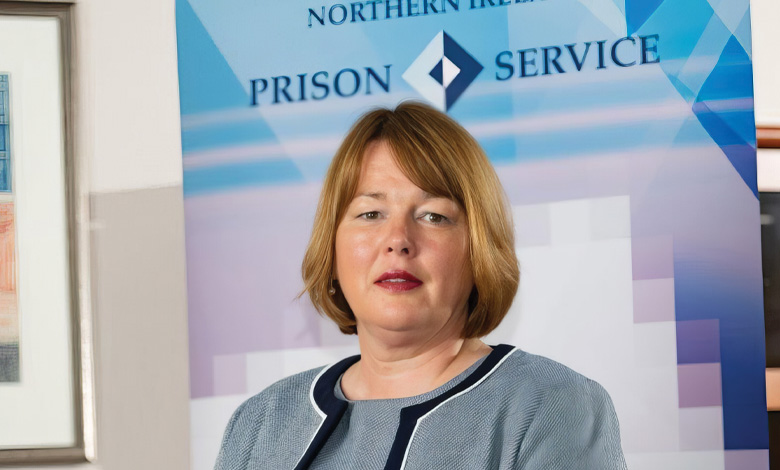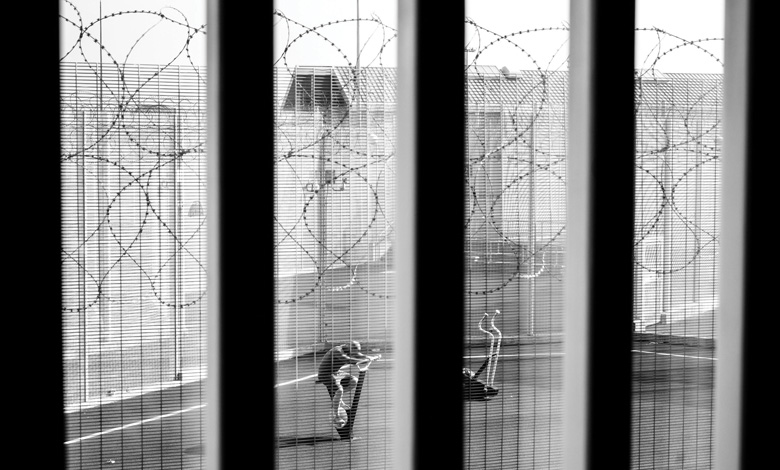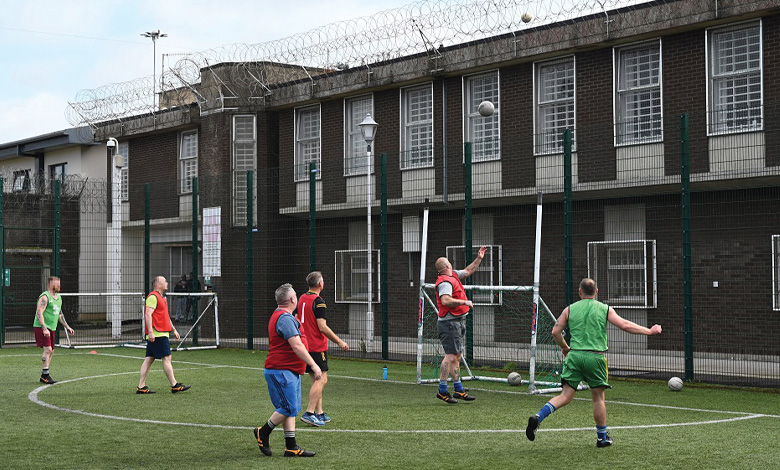A renewed focus on rehabilitation

Six months into her new role, Director General of the Northern Ireland Prison Service Beverley Wall talks to David Whelan about the challenges of a growing prison population and a renewed focus on rehabilitation.
Although less than a year into her new role, Wall attests that her position is not one that enjoys the luxury of a long settling in period.
Having worked in the Prison Service almost 30 years ago, her career has spanned a number of roles across the civil service, most recently as Deputy Permanent Secretary in the Department for Communities. She highlights that she has been involved in heavy engagement with the criminal justice sector and criminal justice policy in that time.
Wall explains a feeling of having come “full circle”, achieving an early career aspiration to hold the role, but admits that much has changed from those early days.
Explaining that managing those changes has now become a core component of her work, she explains: “The pressing issues for me and my staff are the rapid increase and continued upward trajectory of our prison population, alongside a growing complexity of the needs of that population. There has been significant change in this regard from my first involvement in the Prison Service.
“Higher numbers of prisoners struggling with drug addiction, alcohol addiction, and a history of poor mental health is a huge challenge right across all of our establishments.”
Northern Ireland has three operational prisons in the form of Maghaberry Prison, Magilligan Prison, and Hydebank Wood College and Women’s Prison. Currently, close to 2,000 people are in the care of prisons in Northern Ireland, more than is funded for, and the scale of the rise can be seen in a 500 person increase between 2021 to 2024. The rise is the equivalent of the population of Magilligan.
Wall believes that previous justice ministers registered the importance of adequately resourcing the Prison Service, but the service “does not currently have adequate resources to deliver the full rehabilitative regime that we are tasked with delivering”.
Prisons 25 by 25
Wall’s predecessor, Ronnie Armour, oversaw the rollout of Prisons 25 by 25, an ambitious continuous improvement programme aimed at tackling some of the major challenges within prisons.
Quizzed on whether she would be putting her own stamp on the programme, Wall says: “Prisons 25 by 25 provides for me a strong framework and strategy for the year ahead and is something I am happy to sign up to.
“However, what I have done is begun a programme of engagement with our senior leadership team, our staff, and our partners to ensure that that strategy was meeting their needs. As a result, I have agreed some additional work to the programme, which centres on leadership development within the service and reviewing and refocusing how we deliver rehabilitation within prisons.”

Wall explains that the prisoner development model, the framework used for delivering rehabilitation in prisons, has been in place for a significant number of years, and it is her belief that prisoners can benefit from a renewed approach, with the terms of reference for a review having already been established.
Outside of the two major challenges in the form of prison population rise and a greater diversity in the complexity of need of prisoners, Wall faces other challenges.
In 2022, the Criminal Justice Inspection Northern Ireland was highly critical of the operation of care and supervision units (CSU) in the Northern Ireland Prison Service, highlighting that some prisoners within the units experienced regimes “amounting to solitary confinement” and that their treatment did not meet the expected United Nations (UN) Standard Minimum Rules.
A review in 2023 found that “impressive progress” had been made. Wall says that she takes assurance from the review but says that work continues in this area for further improvement.
“I am glad that the inspectors have recognised the significant strides made to improve the care and support that is provided prisoners that are within our care and supervision unit, many of whom are vulnerable. We are continuing to work on how we can best support our staff who work in that difficult environment, and also support prisoners with complex needs.”
Drug prevention
Another Criminal Justice Inspection Northern Ireland report in June 2023 identified a serious drug problem at Maghaberry Prison. A total of 28 per cent of prisoners surveyed said that they had developed a drug problem within the prison and inspectors “identified a number of concerns which included access to drugs and significant areas for improvement in the delivery of education, skills, and work activities”.
Responding to the report, Wall says that a follow up inspection has been largely positive of the work being done within the prison, pointing to the introduction of X-ray body scanners into all three prisons as a “game-changer”.
“Drugs are an issue. They are an issue across society and prisons are often a reflection of that society. The new technology has helped to rapidly reduce the flow of drugs and other illicit substances, but we cannot be complacent about it. Our staff are constantly vigilant of the risk and closing down opportunities for drugs to be brought into the prisons.
“We are working closely with the PSNI to develop joint programmes and that is a relationship I hope to build on in my tenure.”
Beyond illegal drugs, much like in society, the abuse and trading of prescription drugs has become more prominent. Wall explains that alongside its health delivery partners, the South Eastern Health and Social Care Trust, the Northern Ireland Prison Service is committed to reducing the trading of prescription drugs within prisons.
Education
On the topic of education, Wall is aware of the challenge that exists in the high volumes of on-remand or short-sentence prisoners, many of whom choose not to engage in rehabilitative education programmes.
Highlighting a trend where short-sentence prisoners are making up a greater portion of those likely to reoffend, Wall says: “In my view, that is partly due to the fact that we do not have the opportunity to deliver learning and skill development.
“Previously, many of our offered courses ran over a 12-month period and in response, we are working alongside Belfast Met, who deliver education in prisons, to deliver more tailored programmes but also establish a pathway for prisoners leaving prison to continue their education within a further education college.”

Recently, the Northern Ireland Prison Service tasked Belfast Met with delivering a full curriculum review for each of the prisons in Northern Ireland. Wall says this is a key step in ensuring that the Prison Service continues to meet the rehabilitation needs of prisoners and prepares them for employment post release.
In addition, the Prison Service is keen to establish employment advisory boards, and has worked with the Department for Communities to pilot work coaches within Maghaberry prison, helping to ensure that prisoners are best equipped to enter the labour market upon their release. Wall outlines plans for that approach to be rolled out across all establishments following initial success. Tied into ensuring prisoners are equipped to reintegrate with their community, the Prison Service has engaged the Northern Ireland Housing Executive to pilot the use of housing advisors to ensure prisoners exiting prison are supported with suitable and secure accommodation.
“These supports are critical in ensuring prisoners can reintegrate and add value to their local community. We know that when prisoners are supported in this process, they are less likely to reoffend, and hopefully our work now can start to see an overall reduction in the prisoner population.”
Staff wellbeing
Turning to staff wellbeing, Wall says that better supporting staff’s health and wellbeing is a key ambition of her role going forward. Outlining her pride in the work of staff that “do a very difficult job dealing with really complex individuals”, Wall believes that a part of her role is to increase the profile of the work which goes on within Northern Ireland’s prisons.
“By their very nature, prisons are segregated structures. They are surrounded by walls to keep people inside and outside of those walls safe. However, I think we need to metaphorically reduce those walls to enable people to fully appreciate and help address the factors that contribute to criminality and people invariably ending up in prison.
“Looking at things like poor mental health, drug addiction, and securing steady meaningful employment, I believe more can be done upstream to address these issues and prevent people going to prison. I am keen to work with our partners across government and within the community and voluntary sector to see how we can best deliver preventative measures to stop people interacting with the criminal justice system.
“We have seen recognisable success in our interactions with the Youth Justice Agency, where early interventions are leading to a significant decline in young people ending up in the juvenile justice centre. I have a focus to raise the profile of our work outside the prison walls.”
This raising of awareness of the diversity of roles with the Prison Service also plays into Wall’s desire to increase recruitment. Throughout 2023 the Northern Ireland Prison Service carried out a significant recruitment drive and will continue that work into 2024, seeking to fill up to 100 positions.
Quizzed on the scale of the challenge of attracting people to a service, which faces funding pressures and increased complexity, Wall says that the rewards of such a job must not be underestimated.
“Testament to the rewards of the job is the fact that we enjoy high retention rates, based on the progression pathways that we offer, and in the last few years we have also had a notable uptick in people who previously worked for the Prison Service returning to various roles.

“Massive strides have been made since I worked in the prison service almost 30 years ago and I am delighted to see a dramatic increase in the number of female staff, particularly within our male prisons. That is work I hope to continue, recognising the changed environment and dynamic females can bring to the role.
“I also aim to see the Prison Service being more representative of the population we serve and more reflective as a whole.”
For Wall, greater diversity means attracting more people from a catholic community background to the role, something that has been historically difficult, but also ensuring that a wider ethnic diversity is represented. To this end, the Prison Service is conducting outreach work with Queen’s University Belfast and Ulster University to raise awareness of the variety and diversity of career opportunities that exist within the Northern Ireland Prison Service.
“We need to seize those opportunities to raise awareness of the career potential within the Prison Service because while our roles are difficult and challenging, they are really rewarding and bring with them the significant improvement of individuals’ lives.”
Future
Concluding on her aspirations for her role in the time ahead, Wall says that she is intent to build on the opportunities technology presents for greater wellbeing and efficiency within the prison estate. She points specifically to the recent roll out of an online booking system for prison visits, which saw over 700 bookings in the first week, and the continued use of virtual visits in prisons.
She adds: “In my first few months, I have observed a lot of positives about the Northern Ireland Prison Service and equally identified areas where I believe we can improve.
“Together with my leadership team, we have agreed that our focus in the coming years will be on supporting our people, improving our rehabilitation efforts, and optimising technology use to provide a better service.
“I will be working with my senior team to not only ensure that we are doing all we can to maximise our improvement framework out to 2025, but also to plan beyond that timeframe to ensure a Prison Service that is fit for the future.”





